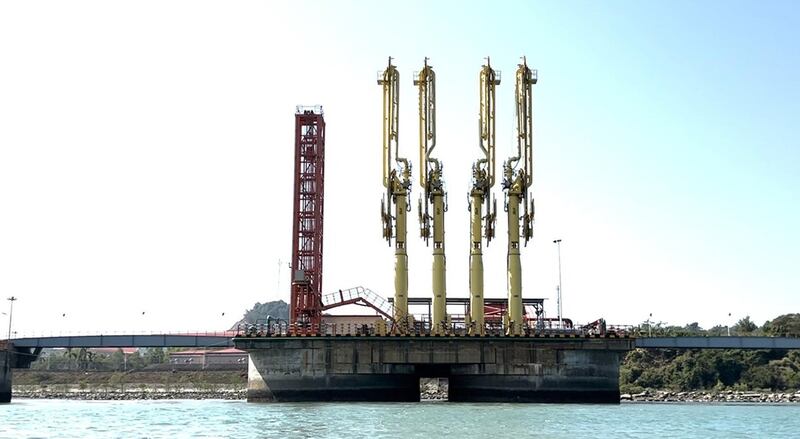UPDATED at 8:24 A.M. EDT on 07-18-2023
Three ethnic armies in northern Myanmar have vowed to protect international investment in their regions which are home to several key Chinese-led projects.
Earlier this month, the Kokang Myanmar National Democratic Alliance Army, or MNDAA, Ta’ang National Liberation Army, TNLA, and Rakhine Arakan Army, or AA, released a joint statement in both Burmese and Chinese vowing to “crush perpetrators of violence” in Shan and Rakhine states.
The move prompted some observers to suggest they were pressured to do so by Beijing.
But Lt. Col. Mai Aik Kyaw, spokesman for the TNLA, said the joint announcement was made to counter the “rise of extortion and terrorist crimes” in Shan state along the border with China since the coup.
“We often see kidnappings and robberies in our areas,” he said. “Businessmen and ordinary civilians are kidnapped for ransom. We have to work for regional stability and peace to counter these problems in the border areas.”
Their statement hints at China’s expanding influence in Myanmar since Beijing has backed the military regime, while other foreign-led investment has fled the country amid a protracted political crisis.
In the past, the three armies have expressed support for the armed resistance battling Myanmar’s military, which seized power in a Feb. 1, 2021, coup d’etat, but are currently in talks with the junta.
According to the MNDAA, around 40 kidnappings took place in Shan state from early 2022 to early 2023. Fifteen Chinese nationals were among those kidnapped, including one who was killed, the group said. Over the same period, 25 Myanmar-born ethnic Chinese and members of other ethnic groups were either robbed or kidnapped in incidents that left six people dead, including one minor.
The MNDAA said four ethnically Chinese Myanmar nationals were sentenced to death for the murders, while five others were sentenced to long prison terms.

Likely pressure from Beijing
Ye Tun, an ethnic affairs and military analyst based in Shan state, told RFA that it is likely that Beijing pressured the three northern ethnic armies to issue their statement, as the incidents could impact Chinese-led investment in Myanmar.
“I think what they meant by ‘international investment’ may mainly be China's investments,” he said.
He noted that the 800-kilometer (500-mile) China-Myanmar Oil and Gas Pipeline, which began operations in 2009, runs from Kyaukphyu in Rakhine state through Mandalay and Magway regions, and northern Shan state.
“There are many Chinese … nationals working along the oil and gas pipeline,” he said. “I believe that these three ethnic armed groups released their statement to prevent incidents that could impact Chinese investments.”
Rakhine state, where the AA operates, is home to several Chinese megaprojects, including the Kyauk Phyu Special Economic Zone and Kyauk Phyu Natural Gas Project. Other Chinese projects – including the Muse Border Economic Cooperation Zone, Chin Shwe Haw Border Business Zone, and Gokteik and Kunlong bridge projects – are based in northern Shan state, where the TNLA and MNDAA operate.
Kyaw Saw Han, a researcher on security issues, told RFA that since the military coup, the situation in northern Shan state has become “more complicated,” and Beijing is likely growing concerned about how it could negatively affect Chinese interests.
“I believe that China pressured the northern ethnic groups to issue the statement to deter threats to its interests in their regions on the border,” he said. “China is worried about the long-term potential for conflict in northern Shan state as many armed organizations are jockeying for territory since the military takeover, and it is warning the groups not to mess with its business and investments.”
When asked by RFA whether the statement was prompted by Beijing, the TNLA's Lt. Col. Mai Aik Kyaw did not give a specific answer. He has previously said that representatives of the Chinese government have appealed to northern armed groups to “help maintain peace and stability” in the border region.
Attempts by RFA to contact junta Deputy Information Minister Major Gen. Zaw Min Tun for the military regime’s response to the joint statement went unanswered Monday.
Clashes decrease in army territories
The AA, MNDAA and TNLA have expressed support for Myanmar’s armed resistance, while the anti-junta People’s Defense Force, or PDF, paramilitary group claims that the ethnic armies have provided it with training and weapons in the territories under their control, as well as in the fiercely contested regions of Kayah and Sagaing.
However, military and political analysts say that fighting between the military and the PDF has sharply declined in regions where the three ethnic armies operate.
RFA was unable to contact representatives of the MNDAA and AA regarding the joint statement.
Nearly 1,500 clashes took place in 61 Myanmar townships where Chinese-led investments are based between February 2021 and March 2022, but the number of incidents dropped by nearly half to just over 760 from between April 2022 and June 2023, according to a statement issued last month by independent research group The Institute for Strategy and Policy (Myanmar).
Translated by Myo Min Aung. Edited by Joshua Lipes and Malcolm Foster.
Correction: An earlier version of this story misspelled "Kokang."
